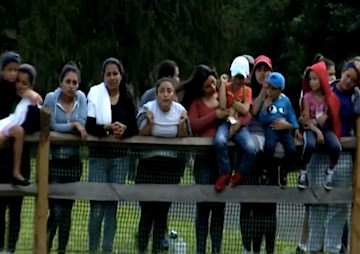Are Obama’s Immigration Prisons for Families Legitimate ‘Child Care Facilities’? Judge Says No
After the ruling, nearly 500 mothers and children were released from detention centers in Texas. Central American mothers and children in detention at Texas' Berks County Residential Center. (NBC News)
Central American mothers and children in detention at Texas' Berks County Residential Center. (NBC News)
Nearly 500 mothers incarcerated with their children at euphemistically-termed immigrant family detention centers in Texas were released over the weekend following a judge’s ruling that such prisons cannot operate as childcare facilities.
The advocacy organization Refugee and Immigrant Center for Education and Legal Services (RAICES) reports that Immigration and Customs Enforcement “hurriedly released over 460 mothers and children from Karnes and Dilley Family Detention Center to Casa RAICES in San Antonio, Texas.” The group says that “majority of families were released without travel plans, forcing RAICES staff and volunteers to work until 4:00 AM on Saturday night to communicate with families and arrange travel.” RAICES explained that it was forced to open another shelter at a local church and convent “to accommodate the overflow from our shelter.”
The Los Angeles Times reports that “one woman suffering from a massive, untreated leg infection was rushed to a San Antonio hospital.”
“We can only hope this is a sign that the Obama Administration is finally deciding to end this failed experiment in family detention,” said Jonathan Ryan, executive director of RAICES, in a press statement. “We call upon the Obama Administration to continue these releases and end family detention, end the detention of asylum seekers, and cut ties with private prison companies.”
Court victory for refugees and asylum seekers
For years, mothers incarcerated with their children at immigrant family prisons have waged hunger strikes, peaceful protests and legal battles to address the grave human rights abuses that they say plague the facilities.
On December 2, some of those immigrants, refugees and asylum seekers won a victory in an Austin court, when a judge blocked the Texas Department of Family and Protective Services (DFPS) from granting childcare licenses to two notorious immigrant prisons: the South Texas Family Residential Center in Dilley and the Karnes County Residential Center in Karnes City.
Hailing from the 250th District Court, Judge Karin Crump issued a final ruling that invalidated the state regulation that allows Karnes and Dilley to receive such licensure.
The Plaintiffs include mothers incarcerated in Dilley and Karnes, as well as the advocacy group Grassroots Leadership. According to a press statement, their case rested on the argument that the Texas Department of Family and Protective Services “is only granted authority to regulate child care facilities and that family jails are not child care facilities. The plaintiffs also said that family detention is harmful to children and that licensing the facilities under lowered standards would only increase the harm suffered by children.”
Following a prolonged legal battle, Crump issued a ruling which states that the regulation allowing childcare licensure for such facilities “contravenes Texas Human Resources Code § 42.002(4) and runs counter to the general objectives of the Texas Human Resources Code.”
A spokesperson for ICE, granted anonymity by the Los Angeles Times, reportedly claimed that the massive release of mothers and children from Dilley and Karnes over the weekend was unrelated to the court ruling, stating: “ICE is currently reviewing the court’s ruling on the matter of the operating license for the South Texas Family Residential Center. Operational activities continue without interruption at this time.”
But RAICES staff told reporter Nigel Duara that they had never seen such a large number of people released from Karnes and Dilley to their shelter at once.
The stain of family prisons
That Texas authorities sought to license such facilities for childcare at all underscores the troubling legacy of an Obama administration that has repeatedly demanded the authority to lock up children—and battled courtroom efforts to challenge those powers.
In 2014, the mass detention of families fleeing violence and poverty in Central America became the cornerstone of Obama’s response to the displacement crisis, which was exacerbated by U.S. policies in the region. The resultant large-scale incarceration of children was condemned by human rights organizations, the U.S. Commission on Civil Rights and a survivor of a World War II-era Japanese-American internment camp.
In July 2015, Federal District Court Judge Dolly Gee struck a blow against this Obama administration policy by ruling that the U.S. government may not detain children in a facility that is not licensed for childcare. The Obama administration has vigorously resisted court efforts to shut down its family prisons, including by teaming up with Texas state authorities in a bid to gain childcare licensure for immigrant prisons.
Human rights campaigners hope that the Austin judge’s ruling will bring all family prisons one step closer to permanent closure. In addition to the two Texas facilities, the Berks Family Residential Center in Pennsylvania is the only remaining family immigrant prison.
“The state’s executives admitted in documents and testimony that DFPS wanted to license these facilities to help the federal government, and not the children,” said attorney Jerry Wesevich, who works for Texas RioGrande Legal Aid. “Motive matters and we believe it was the key to the case.”
According to Bob Libal, executive director of Grassroots Leadership, “The idea that these are not prisons does not pass the smell test. Essentially, whenever you are held against your will in a facility operated by a private prison corporation or state, that’s a prison-like facility. They are certainly not childcare facilities. These families cannot leave, the facilities are operated by prison corporations and there have been a series of instances of allegations and abuse that are very prison-like.”
While Dilley is run by CoreCivic, formerly the Corrections Corporation of America, Karnes is operated by GEO Group. Notably, Karnes has been rocked by repeated repeated hunger strikes over allegations of inhumane conditions, including severely-underpaid labor, lack of legal representation and contaminated drinking water. In 2014, some women detained at the prison reported that guards sexually assaulted them.
The Department of Justice claims that it will phase out the use of private prisons for 13 facilities that fall under the Bureau of Prisons, but the new directive does nothing to reduce the overall prison population or phase out the vast industry reaping profits from the incarceration of immigrants, migrants and refugees. While the DHS claims to be reviewing its heavy reliance on private prisons, this has not translated to a similar commitment to reduce its reliance on the industry.
Trump administration looms
Meanwhile, the incoming administration of Trump and his bevy of far-right appointees does not bode well for addressing human rights abuses in immigrant prisons. So far, Trump’s appointees include White House chief strategist Steve Bannon, who headed the white nationalist publication Breitbart, and Attorney General nominee Jeff Sessions, who was deemed too racist to serve as a federal judge under the Reagan administration. On Thursday, press outlets reported that Trump will appoint General John Kelly, known for fueling drug wars, violence and displacement in Latin America, as head of the DHS. During the 2014 crisis of mass displacement from Central America, Kelly played a key role in launching the Alliance for Prosperity, a militarized “solution” that was widely condemned by human rights organizations.
Trump claims that, during the first 100 days of his presidency, he will “begin removing the more than 2 million criminal illegal immigrants from the country.” That statement follows earlier campaign pledges to build a “deportation force” to expel 11 million people. While it is difficult to predict how such threats could play out in practice, both policies could see a dramatic expansion of the Obama administration’s family incarceration policies.
Because of this danger, human rights campaigners say now is a critical time for the Obama administration to disavow such internment. “We are calling on the Obama administration to end the policy of family detention now so that it isn’t handed over to Trump,” Bethany Carson, immigration policy researcher and organizer for Grassroots Leadership, told AlterNet.
“We are glad the court heard our concerns about the damage that family detention does to mothers and their children and how lowering standards to issue licenses to these facilities only exacerbates that harm,” said Libal. “We now call on the Obama Administration to end the practice of detaining immigrant families once and for all.”
Your support is crucial...As we navigate an uncertain 2025, with a new administration questioning press freedoms, the risks are clear: our ability to report freely is under threat.
Your tax-deductible donation enables us to dig deeper, delivering fearless investigative reporting and analysis that exposes the reality beneath the headlines — without compromise.
Now is the time to take action. Stand with our courageous journalists. Donate today to protect a free press, uphold democracy and uncover the stories that need to be told.







You need to be a supporter to comment.
There are currently no responses to this article.
Be the first to respond.